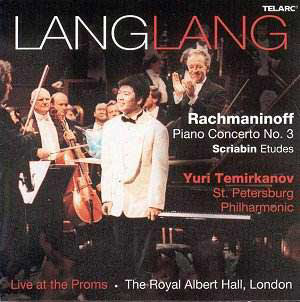The centrepiece of this disc by the much-heralded nineteen-year-old
Lang Lang is his 2001 Proms performance of Rachmaninov’s Third Piano
concerto. Lang Lang was born in China and by the age of thirteen had
performed Chopin’s Etudes – both sets – in both Beijing and New York.
Accepted into the Curtis Institute in 1997 he currently studies with
Gary Graffman. Like many a young soloist he came to prominence by substituting
for an ailing colleague – in this case in 1999 for André Watts.
It was a challenge for Telarc both to record him in
the Rachmaninov and also in the Albert Hall. The former is a notorious
pianistic minefield, the latter a notorious venue. I can offer only
a qualified welcome aurally. The Hall has defeated the most sophisticated
of recording teams and Telarc’s is no exception. The piano is very closely
miked, orchestral detail submerged and frequently diffuse. Subsidiary
and counter themes are often barely audible and though the engineers
catch some fine orchestral contributions the aural perspective remains
decisively skewed in favour of the soloist, to the detriment of the
musical argument.
There is no doubt that Lang Lang is already a formidably
equipped pianist. He has a technique that remains pretty much unruffled
by Rachmaninov’s exorbitant demands. His sensitivity to the musical
syntax is equally apparent and the pairing with Temirkanov is clearly
a successful one, with the conductor solicitous to the needs of his
soloist – maybe over solicitous on occasion. Lang Lang opens the Concerto
with an inward and musing intimacy which is very attractive. I greatly
liked the still-raw sound of the Russian Orchestra’s horn section and
Lang Lang’s nicely graded tonalities with their range of horizontal
colours and the evenness of his tone production. In the slow movement
Temirkanov gives the burnished lower strings full rein in their lyrical
statements and Lang Lang plays with involvement and intimacy. But I
found a sectionality to the playing and a disjunctiveness at their chosen
tempo which rendered the movement too solidly emphatic. In the finale
Telarc captures the delicious piano and flute passage with fidelity
but again I found the rubato applied rather than organic, the fluctuations
of tempo disruptive and the tempo relationships too approximate. As
the movement develops important orchestral thematic material is lost
in the balance and Lang Lang’s enthusiasm, though admirable, crucially
lacks wit and a sense of architectural goal. It’s perhaps unfair to
a talented young artist constantly to rake up the names of the composer
himself, of Horowitz and Earl Wild but the fact remains that in their
hands the concerto propels itself onward with engulfing logic and momentum,
incidental felicities subsumed into the fabric of the score. Even without
these three names there are now about fifty recordings of the Concerto
in the catalogue. I’m sure Lang Lang will return to the Concerto in
time in a more sympathetic acoustic and with increased experience.
Scriabin, born a year earlier than Rachmaninov, is
an appropriate disc mate. Lang Lang has selected ten Etudes covering
opp 2, 8, 42 and 65 but concentrating very much on op 8. He catches
something of the scaled passion of these miniatures with playing that
is alive to the potential for colour and deftness. In Op 8 No 10 he
employs an incendiary rifle shot bass whereas he is plangently evocative
in Op 8 No 11. There’s some dizzying playing in Op 8 No 12 and in the
early Op 2 No 1 he is sensitive to the cushioned potential of the music.
Jonathan Woolf
See also review
by Christopher Howell
Marc
Bridle interviews Lang Lang


![]() See
what else is on offer
See
what else is on offer 